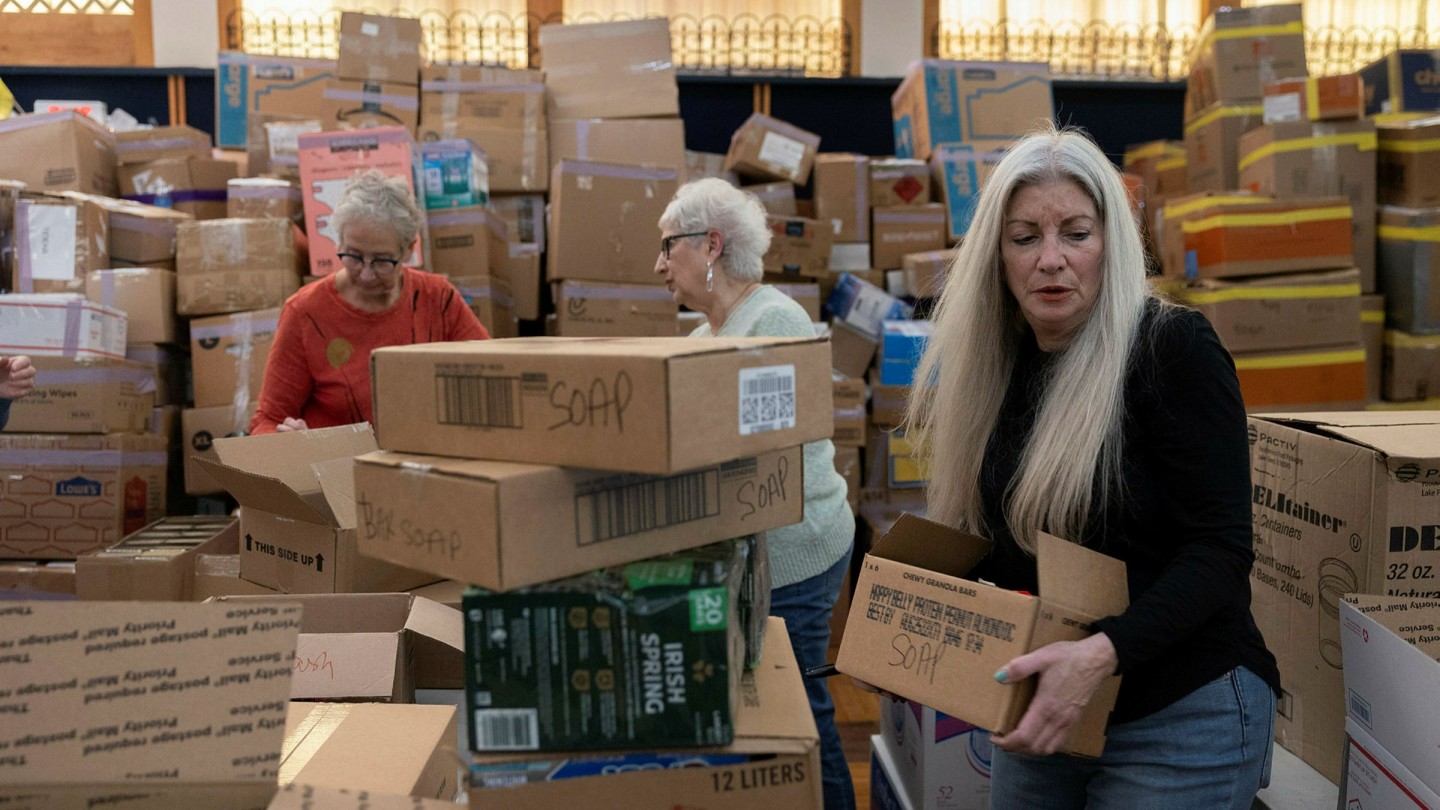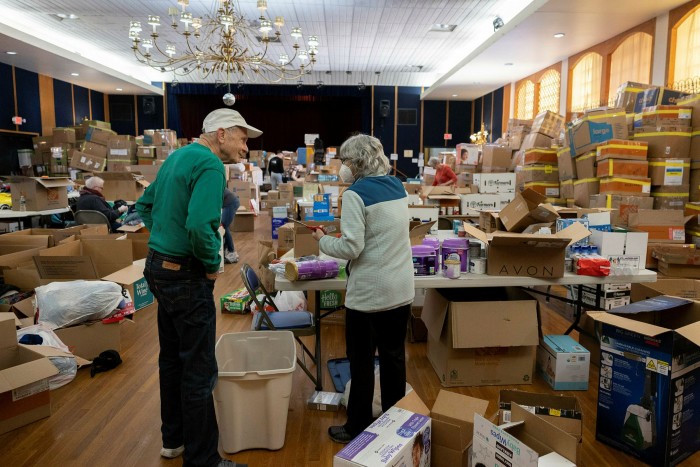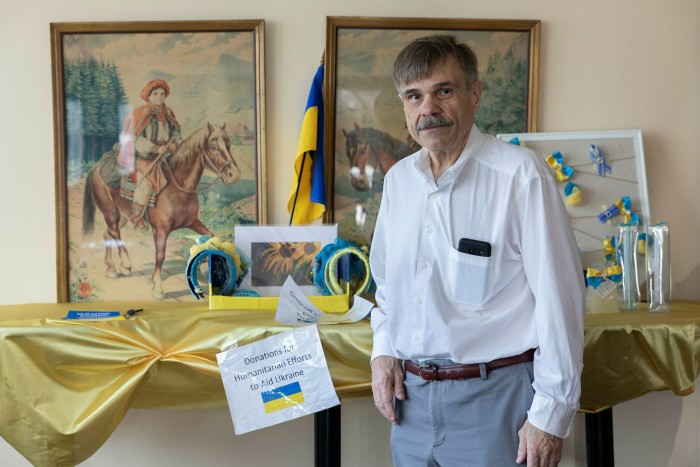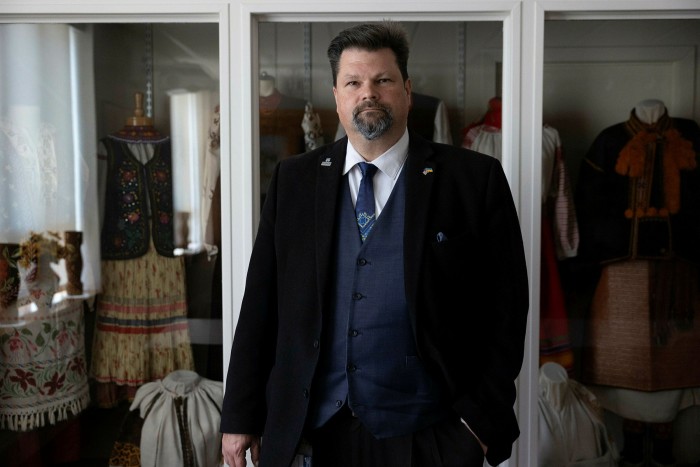Ukraine’s American diaspora mobilises with packages and prayers

Simply sign up to the War in Ukraine myFT Digest -- delivered directly to your inbox.
The banquet hall at the Ukrainian Educational and Cultural Center in Jenkintown, Pennsylvania typically hosts weddings and graduation ceremonies.
But on a recent Saturday morning it was crammed with boxes overflowing with underwear, energy bars, bandages, baby clothes and myriad other items destined for people in need in Ukraine. They were being packaged and assembled by members of the local Ukrainian diaspora who were in need of distraction from the news and a way to be useful to friends and loved ones suffering back home.
“These people, it’s probably their parents and grandparents who are in Ukraine right now,” said Natalie Firko, the director of the centre, as the distinctive screech of packing tape and greetings of ‘slava Ukraini!’ (‘glory to Ukraine!’) filled the air.
What began with a single woman, Olga Mykhaylyuk, planning to fill 30 boxes with donated goods and send them to Ukraine has become in a matter of days a humming operation that has now stacked more than 8,700 boxes, and counting. Each time a loaded truck leaves the centre it is blessed by a Ukrainian Catholic priest and then serenaded with the national anthem.
For Ukraine’s anguished American diaspora, the crisis in the homeland has been devastating but also resulted in a moment of unity and mobilisation. And it has brought visibility to their culture and cause from a wider public that may have known little about it.
“When we were growing up, we had to have an elevator speech explaining what a Ukrainian was,” said Nicholas Rudnytzky, the dean of academic services at Manor College in Jenkintown, a Catholic school founded in 1947 by the Ukrainian Sisters of Saint Basil.
People often assumed Ukrainians were Russian, Rudnytzky noted. Some, such as actress Mila Kunis, born in Chernivtsi before emigrating to the US, identified themselves as such because, she explained in a recent interview with Maria Shriver, it was “exhausting” to explain otherwise.

Now Kunis is publicly embracing her Ukrainian heritage, part of a wider upwelling of pride and recognition unleashed by Russia’s invasion. Ukraine’s president, Volodymyr Zelensky, has become a celebrity in the US for his resolve and courage. From Phoenix to Washington, thousands have joined marches to show solidarity with Ukraine. Small gestures, such as the Boston Youth Philharmonic Orchestra’s recent performance of the country’s national anthem, have become commonplace.
Meanwhile in Pennsylvania, New York and New Jersey, home to large Ukrainian-American populations, the governors have imposed separate economic sanctions on Russia beyond those implemented by the federal government.
“We’ve been fighting to get some level of recognition for so long,” said Eugene Luciw, an attorney who is also a member of the Ukrainian Congress Committee of America, which lobbies for Ukrainian causes. “You cry because they’re coming to light because of an attack, because people are being bombed.”

There are about 1m or so Ukrainian Americans — although many believe the actual number is higher because so many have either registered or been misidentified as Russian or Polish over the years. They came to the US in waves, beginning in the late 19th century when immigrants from western Ukraine went to Pennsylvania towns such as Scranton and Wilkes-Barre to work in the coal mines. They also flocked to mills and factories in nearby Philadelphia. The Ukrainian church soon followed.
Successive waves came after the first and second world wars, fleeing political persecution, and then in the late 1990s after Soviet leader Mikhail Gorbachev introduced his glasnost policy.
Jenkintown, 10 miles north of Philadelphia, became a Ukrainian-American hub as the community migrated from the city to the suburbs. Like other enclaves, it features a Saturday morning school where children learn about Ukrainian language and culture — not always willingly.
“For years we were deprived of the premier cartoons of our generation because our parents sent us here,” Rudnytzky joked.

Any adolescent protests tend to be overcome by their elders’ determination to preserve their heritage. Firko recalled her parents’ palpable fear when she was growing up that Ukraine and its culture might be lost. They had come to Philadelphia in the 1950s after surviving German and then Russian domination in the second world war.
“For my parents, it was: ‘you’ve got to keep this up.’ They feared Ukraine might disappear,” she explained, noting how they taught her Ukrainian before English — a practice she has repeated with her own children.
The local cultural centre, which celebrated its 40th anniversary in 2020, now educates hundreds of students each Saturday — some clad in Philadelphia Phillies or Eagles jerseys. It also hosts community groups for Ukrainian-American veterans, senior citizens, engineers, and the like, as well as a library with more than 20,000 volumes.
Its hallways are adorned with framed photos of graduating classes, including one from 1985 featuring Firko. Each face is, in its small way, a defiance of Russian president Vladimir Putin’s effort to erase the idea of an independent Ukrainian culture and identity distinct from that of Russia.
“This notion Putin has that Ukrainians don’t exist is an absurdity,” Luciw said. “But it’s an old absurdity.”
That spirit of defiance was evident in the banquet hall, where volunteers worked at a frenetic pace, sorting goods and packing boxes, beneath a chandelier and disco ball. Each day someone posts an online list of requested items — from gear for soldiers or fighters such as flashlights and bulletproof vests to baby bottles — and volunteers then drop off what they have or donate money to buy it.
As the snow fell on a recent morning, the donations piled up at one door, forming a small mountain of garbage bags. After passing through many hands, their contents were ready to leave through another in sealed, colour-coded boxes. Meest-America, a New Jersey parcel company that specialises in shipping goods to eastern Europe, has been transporting them for free. The boxes are flown to Poland, and then on to Lviv and other points in western Ukraine.
The volunteers were mostly Ukrainian-Americans, but also friends and neighbours and others with no obvious connection at all — except that they were suddenly impassioned by the cause. Local restaurants and a brewery have supplied food and beer for the workers.
“This is the little bit we can do,” Firko said, taking in the organised chaos. “The packing and the praying.”
Comments